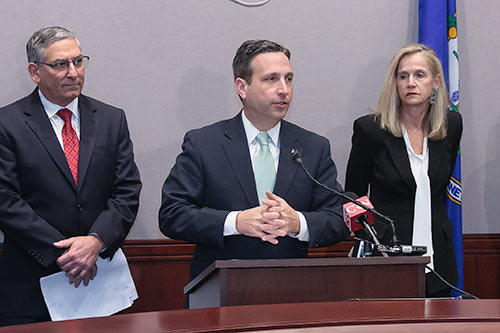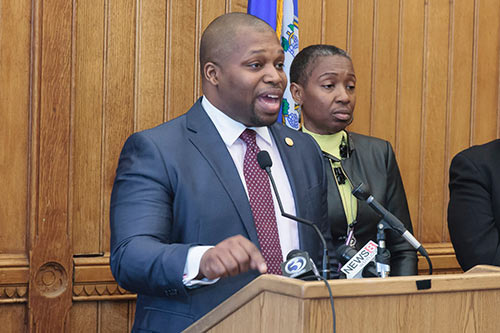Bipartisan Call for Unified Effort to Establish Connecticut as a Bioscience Powerhouse
With precision medicine becoming big business in Connecticut, the Commerce Committee has produced bipartisan proposals to coordinate efforts across the state, prepare Connecticut’s workforce and position Connecticut as a national leader in biomedical research.
Members of the committee today stressed the need for cooperative support from government, education and private business in growing Connecticut’s bioscience sector. The legislators highlighted several bills they intend to support, and called for continued cooperation between the University of Connecticut, Yale University, The Jackson Laboratory and other stakeholders.
“The Connecticut Health Data Collaborative has identified precision medicine and personalized health as a sector in Connecticut with tremendous power and potential,” said Senate President Pro Tempore Martin M. Looney (D-New Haven). “This group has proven to be critical in the advancement of our bioscience sector across the state and we need to continue encouraging that kind of cooperation between stakeholders. The Yale Center for Genomic Analysis, The Jackson Laboratory, Mount Sinai Genetic Testing Laboratory, the University of Connecticut, our hospitals, and insurance companies are pieces of a gathering critical mass of bioscience and precision medicine organizations throughout Connecticut will have strong and positive reverberations across the state. Establishing Connecticut as a hub for bioscience research and development will continue to attract and increase a skilled international and national bioscience workforce.”
“Connecticut is locked in a global competition to create good-paying jobs and support high-growth industries,” said Senate Majority Leader Bob Duff (D-Norwalk). “Our talented, hardworking, and highly educated work force is second to none. Connecticut possesses all of the ingredients to capitalize on the exponential growth that is set to occur in precision medicine and biomedical research. These bipartisan proposals will help set Connecticut on a course for tremendous growth.”

“I thank the members of the Commerce Committee for working so well together to advance multiple ideas to encourage development in bioscience,” said Senate Republican President Pro Tempore Len Fasano (North Haven). “We have an incredible workforce in our state and Connecticut should always be looking at new ways to support those workers and to grow new job opportunities. Proposals to bring to light more information and oversight are certainly ideas that lawmakers on both sides of the aisle can come together on, show unity and work to further explore ways to support industry growth.”
“Connecticut has the opportunity become a global leader in bioscience and precision medicine, but we need the full cooperation of our government, research universities and private industry to make this happen,” said Senator Joan Hartley (D-Waterbury), Co-Chair of the Commerce Committee. “Bioscience, particularly precision medicine, is expected to grow dramatically in the next one to three years, and Connecticut is well-positioned to be the place where much of that growth happens, creating new jobs and providing the shot in the arm our economy needs. This isn’t about one political party, one university or one business. This is something that will benefit us all, and we all need to work together to make that happen.”
“We already employ tens of thousands in bioscience in Connecticut and these bills will help the industry add more good-paying jobs,” said state Representative Caroline Simmons (D-Stamford), who is House chair of the Commerce Committee. ”I’m proud of the Commerce Committee and Sen. Hartley for such strong bipartisan support of these initiatives.”
A 2015 economic competitiveness survey of Connecticut found that the state has great assets and economic drivers in research and development, bioscience and health data. Connecticut has some of the world’s top research universities, producing students eager to bring their cutting-edge ideas to market. Connecticut also has the benefit of being home to The Jackson Laboratory, as well as numerous other bioscience and precision medicine companies eager to establish the state as a hub for this kind of work, attracting experts from around the world and retaining the current and developing experts the state already has.
Legislators identified three specific bills they intend to support: all three bills received overwhelming, bipartisan support when they came before the Commerce Committee, and now await action on the Senate calendar. These bills aim to better understand Connecticut’s strengths so that they can be built upon, ensuring the state is supporting this growing industry in the most effective and efficient way.
Senate Bill 959 requires that Connecticut evaluate and strengthen the workforce pipeline to better meet the needs of the bioscience and precision medicine sector. This will ensure that Connecticut’s state college and university system is preparing students for jobs needed in these sectors, including: researchers and clinicians, data scientists, health informaticians and genomic counselors. The demand for each of these jobs is growing, and Connecticut residents will be trained to meet that demand.
Senate Bill 962 will establish clear metrics to measure the effectiveness of state dollars being used to support the bioscience and precision medicine sector. As this industry grows, it is critical that the state know how to best target its financial support in order to ensure maximum job growth and economic impact. Once implemented, Senate Bill 962 will give the state a more accurate picture of industry trends, allowing the Department of Economic and Community Development and its other partners to better target state resources.
Senate Bill 968 provides for the continued work of the successful Connecticut Health Data Collaborative, a network of public and private partners with diverse and complementary backgrounds. This collaborative has brought together leaders from Connecticut’s most prestigious research institutions, led by the Yale Center for Genomic Analysis, The Jackson Laboratory, Mount Sinai Genetic Testing Laboratory, and the University of Connecticut as well as hospital representatives, leaders from some of the largest insurance companies in the country situated here in Connecticut, and representatives from our state’s technology advancement sector. Together, they have envisioned a bold plan for our state and we look to them to forge a path forward that will establish Connecticut as a national leader in bioscience and precision medicine.
